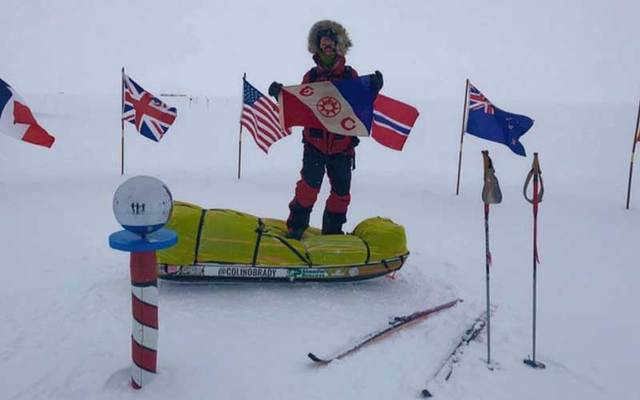An Irish American adventurer has crossed Antartica, the first person to do so alone and unaided.
American adventurer Colin O’Brady, 33, has beaten off Englishman Louis Rudd, 49, to become the first person to cross Antarctica unsupported and unaided.
Only two other men have attempted the challenge before, both in the past two years. One of the men quit after 52 days, and the other died.
Read More: Recalling the great Irish Antarctic explorer Ernest Shackleton
Rudd, a 33-year veteran and current captain of the British Army, has been on previous expeditions to Antarctica, having already skied more than 2,500 miles. In 2016, he led a five-man team of British veterans across the continent.
In October, O’Brady, a newcomer to the polar adventure community, declared his intention to attempt the crossing.
O’Brady is no stranger to overcoming hardship and challenges.
After a near-death accident burned his legs and feet in 2008, he was told he might never walk again. Eighteen months later, he won the amateur division of the Chicago Triathlon and spent the following six years as a professional triathlete, including as a member of Team USA.
He began mountain climbing in 2016 and quickly set the world record for the fastest completion of the Seven Summits, climbing the highest peak on each continent and the related Explorers Grand Slam (Last Degree). During this past summer, he broke the speed record for the 50 High Points Challenge, climbing the highest point in each state in the U.S. in 21 days.
A social-media savvy self-promoter, O’Brady posts daily updates from the Antarctica expedition to his 66,000 Instagram followers.
Both men were in the race are raising funds for charities — Rudd for veterans and O’Brady for children’s health.
The men met for the first time in late October while making preparations for their expeditions in Punta Arenas, Chile. On November 3, a Twin Otter ski plane deposited them a mile apart on the Ronne Ice Shelf, a few miles out from the beginning of the Antarctic continent.
Rudd was in front for the first five days, but on day six, newcomer O’Brady caught up. After the men had a brief chat, Rudd explained he let his competitor pass because he was, “Very keen to maximize the solo experience... and kept about a kilometer apart throughout the day.”
After a long 18-mile day pushing each other, Rudd decided to give up trying to keep O’Brady insight, explaining in his day’s report, “There’s still a long, long way to go and a lot can happen yet, so I’m going to stay focused on my plan. Hopefully, we’ll naturally separate, it’d be better I think to be out here on our own experiencing the solo journey as it should be.”
When Rudd came out of his tent on the morning of the seventh day, he found O’Brady had already left. Rudd reported, “ It’s actually a good thing for both of us—we want to do be doing our own separate solo journeys...Now I can just focus on my expedition, my journey, and kind of do it my way. That’s what I came here for.”
On day 40, O’Brady posted a photo at the red and white striped marker that officially designated the South Pole.
When he finally reached the end, he ended his 932-mile expedition with an 82-mile ultra marathon and even picked up speed as he raced toward the finish line ahead of schedule. He reached the finish line on the Ross Shelf on December 26. Rud was still 73 miles from the finishing line at the time.
Before his expedition, O’Brady declared: “This project is for anyone who has ever been told their dreams are impossible.”
Read More: Why has Ireland not yet honored its greatest Antarctic Hero?




Comments